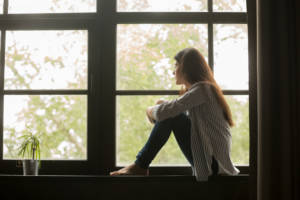The Value of Solitude in the COVID-19 Age

Solitude can present a unique opportunity for spiritual, mental, and emotional growth, and what better time to experience it than during a pandemic.
Humans find a lot of value in community, especially sharing spiritual experiences with others. Nearly every major religion integrates communal fellowship into its traditions. However, they also stress the need for solitude in deepening one’s spiritual life. With the coronavirus pandemic forcing billions of people to stay inside their homes, the potential for solitude is at an all-time high. If effectively harnessed, it can present a unique opportunity for spiritual, mental, and emotional growth.
Examples of Solitude From World Religions
For those seeking spiritual enrichment in solitude, plenty of examples exist. The Tanakh mentions Moses, Elijah, and Jacob meeting alone with God. In Islam, Muhammad’s first revelation occurred when he was alone in the cave of Hira just outside of Mecca. The Bible’s New Testament describes Jesus frequently going into the wilderness by himself to pray.
There are more examples outside of the major Abrahamic religions. Buddha is said to have meditated under the Bodhi tree for several weeks. Guru Nanak, the founder of the Sikh faith, said that “he who meditates in solitude attains supreme bliss.” Some Neopagans embrace solitary practice instead of joining covens or other groups. Patti Washington, a historian and pagan high priestess, explains that some Wiccans don’t live near any covens and others benefit from setting their own pace and avoiding covens’ interpersonal dynamics.
Why We May Avoid Solitude
In a piece for The Atlantic, journalist Brent Crane observes that most humans try their best to avoid solitude. “It has been considered an inconvenience, something to avoid, a punishment, a realm of loners,” he comments. Humans are social beings, thanks to thousands of years of evolution. Recognizing strength, safety, and better survival odds in numbers, our earliest ancestors lived in small tribes containing several families. Without the protection of a larger group, social outcasts would have been more likely to die from animal attacks, lack of shelter, or starvation.
It’s easy to conflate solitude with loneliness, especially when solitude isn’t deliberately chosen. For some, their busy schedules make it impossible to savor a few quiet moments alone. Others try to avoid their chaotic inner lives: minds filled with anxiety, regret, fear, worry, or other things that make them uncomfortable. Whether it’s a throwback to ancestral fears is uncertain, but being alone can be a significant source of stress.
An Opportunity for Growth
Indeed, too much isolation can harm our physical and mental health. In small doses, however, it can be beneficial. Vox’s Sigal Samuel describes it as a skill. “Lean into it,” she advises, then draws examples from people who’ve dealt with involuntary isolation. “You have to learn how to deal with yourself,” says Keith Lamar, an American man who has spent 27 years in solitary confinement. Professor and researcher Matthew Bowker adds that making the most of being alone can “generate meaningful and valuable experiences in the internal world.”
Being plunged into social isolation while sheltering in place isn’t easy. Recognizing our discomfort is key: Observing and sitting with the emotion is vital, but it’s important to stay detached. Emotions bring with them sensations, and those sensations can and do pass.
Reconnecting with our internal world during periods of solitude is beneficial, but experts warn against completely disconnecting from outside reality. Sensory awareness and grounding techniques are useful for combating anxiety. Keeping track of something in our outside environment can also help ground us, such as rainfall, temperatures, or the birds outside our windows. Routines also help us stay connected and provide structure to our days.
Remembering Purpose in Your Solitude
People all over the world are struggling with pandemic-related isolation. Rather than running from solitude, learning to embrace it can improve our lives. Balancing time spent alone with engaging in technology is a useful strategy to process our discomfort, find relief when we need it, and remain connected with those who matter to us most.

